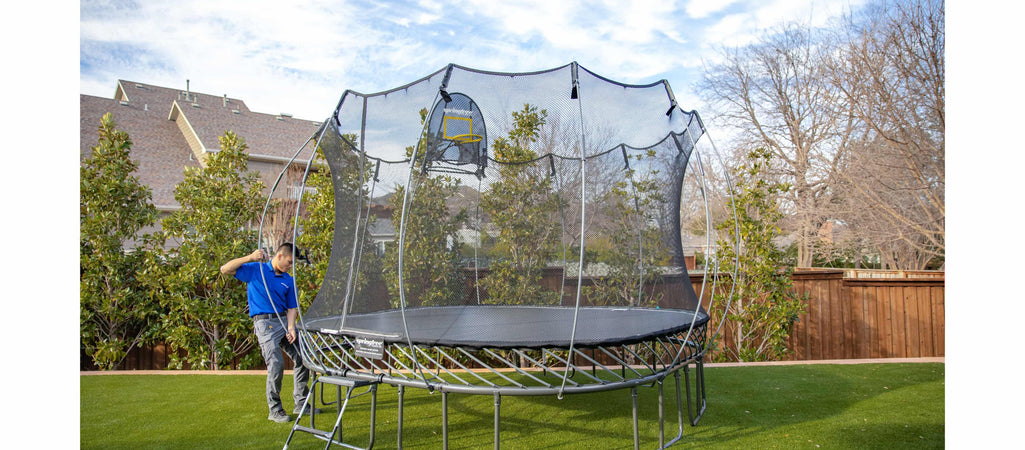How Tall Is a Trampoline? (Must-Read Before Buying)
Before buying a trampoline, find out how height affects factors like safety and bounce quality. It's more important than you think! Ensure you make the right choice.
min read

It's crucial to understand how tall a trampoline is before making it a part of your backyard.
The height of a trampoline affects many things, like:
- The safety of your jumpers.
- The bounce quality of your trampoline.
- The complexity of the assembly process.
- The aesthetics of your backyard.
We will use our decades of expertise to explain how tall backyard trampolines are and what to consider before purchasing one.
Make sure to read carefully – this is a much more important topic than you think!
How Tall Is a Standard Trampoline?
Standard outdoor trampolines with enclosure nets are typically 7-9 feet from the ground – although this will vary based on the size and brand of trampoline.
From the ground to the jumping mat is about 2-3 feet for most trampolines.
However, that’s without the trampoline enclosure net.
Enclosure nets are almost universally sold throughout the trampoline industry nowadays.
ASTM, the leader in crafting trampoline standards, states that enclosures should have a minimum height of 50.8cm (about 1.6 ft).
When accounting for the height of your potential trampoline, include the enclosure as a part of the calculation (we never recommend jumping on a trampoline without a net).
Here’s an example of a Springfree Trampoline without the enclosure (just for reference – don’t jump without the enclosure!)

Springfree Trampoline.
Here’s a Springfree Trampoline with the enclosure (huge difference in height!):

Springfree Trampoline.
Besides the height of the enclosure net, the size of the frame can also play a role in a trampoline’s height.
5 Reasons Why the Height of a Trampoline Is Important
The height of a trampoline is important for several reasons.
Let’s break each of them down in detail.
1. Trampoline Safety
A trampoline’s height affects multiple safety components, such as:
- Fall Risk – Taller trampolines increase the likelihood of injury if you were to fall to the ground.
- Overhead Obstacles – Tall trampolines could be closer to overhead obstacles, like tree branches or power lines (more on this in the Installation section)
- Access – A tall trampoline might not be as easy to access and could require a ladder to enter/exit safely.
See the image below for what a trampoline ladder looks like:

Springfree Trampoline.
These safety risks can largely be mitigated by following basic jumper safety rules and buying a high-quality trampoline with a strong enclosure system.
2. User Experience
The jumper matters when choosing what trampoline size you need for your backyard.
A young child (say 6-10 years old) who wants a short-term trampoline to use for fun would be a fit for a shorter trampoline.
They will be easier to access and won’t take up as much space.
An older child or adult who needs a trampoline for athletic purposes (gymnastics, cheerleading, workouts, etc.) would be a fit for a taller trampoline.
This ensures they have plenty of room to practice their moves and won’t outgrow the trampoline.
3. Bounce Quality
The bounciness of a trampoline is affected by many factors.
While it’s not the most important factor for a trampoline’s bounce quality, a trampoline’s height can influence its bounciness.
Taller trampolines may offer a greater bounce due to a higher frame that can accommodate more springs or rods (on a springless trampoline).
The height of a trampoline can also affect the tension of the mat, which can impact the bounce height.
4. Installation
The installation process for tall trampolines might be more difficult than small trampolines.
The difficulty of assembly varies depending on which type of trampoline you’re talking about.
Generally, bigger trampolines are harder to assemble than smaller trampolines.
With taller trampolines, you’ll need to find a spot free from overhanging tree branches or power lines.
We typically recommend 3-5 ft from vertically standing obstacles when installing. We also recommend the same clearance space around the trampoline.

Springfree Trampoline.
5. Backyard Aesthetics
Finally, the height of a trampoline affects the look of your backyard.
Taller trampolines stick out more than smaller trampolines.
This can be a good or bad thing depending on how visually pleasing the trampoline is and the current landscaping of your backyard.
If you want a long-term backyard trampoline that doesn’t stand out, you would be a fit for an inground trampoline.
Inground trampolines are installed in the ground and only stand about 0.5 ft-1 ft tall.
However, they are difficult to install, with costs potentially exceeding $5,000.
That’s why you usually see above-ground trampolines in most backyards.
Examples of Trampoline Heights (Springfree)
To further answer the “How tall is a trampoline?” question, let’s look at examples of Springfree Trampoline heights broken down by size -- with pictures:
Springfree 6 ft Trampoline

Springfree 8 ft Trampoline

Springfree 10 ft Trampoline

Springfree 13 ft Trampoline

Most Springfree Trampolines are 9 ft tall, but as you can see, the smaller models will be a little shorter.
Generally, 9 ft tall is a good standard size to work with no matter the trampoline brand.
Your Expert Guide to Choosing the Right Trampoline Size
As you now know, a trampoline’s height is essential to consider when planning for a trampoline.
But a trampoline’s height is just one factor in the trampoline size equation.
Along with height, you must address key questions like:
- Can the trampoline fit properly in your backyard?
- Will you have enough jumping space to accomplish your trampoline goals?
- Will your kids outgrow the trampoline?
Check out our Trampoline Size Guide and ensure that you answer these make-or-break questions before spending any money!

